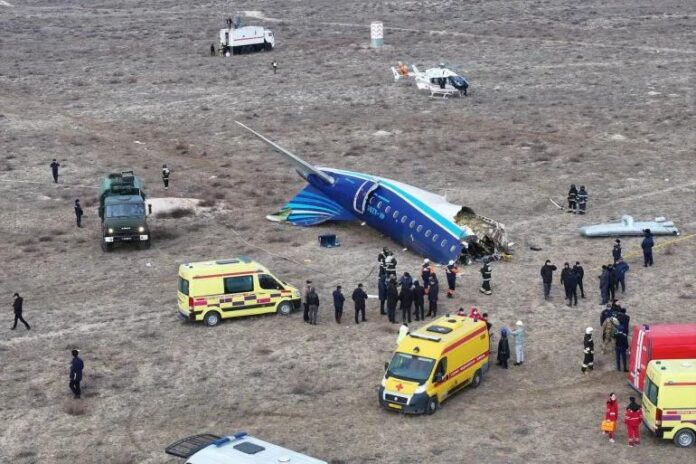In a dramatic escalation of tensions, Azerbaijani President Ilham Aliyev has accused Russia of firing on an Azerbaijan Airlines (AZAL) passenger plane before it tragically crashed in Kazakhstan, killing 38 people. Aliyev’s direct allegations against Moscow mark a significant departure from the traditionally strong ties between the two nations.
Speaking to state media at Baku International Airport, Aliyev alleged, “The facts are that the Azerbaijani civilian plane was damaged from the outside over Russian territory, near Grozny, and almost lost control.” He claimed that Russian electronic warfare systems disrupted the Embraer 190’s navigation, while ground fire severely damaged the aircraft’s tail.
The ill-fated flight, which carried 67 passengers and crew, was en route to Grozny, the capital of Chechnya, when it encountered trouble. Diverting from its intended path, the plane eventually crashed in Kazakhstan on December 25.
Russia’s Denial and Azerbaijan’s Demands
The Kremlin has so far denied direct responsibility for the incident. President Vladimir Putin acknowledged the tragedy in a phone call with Aliyev but stopped short of admitting any wrongdoing. According to a Kremlin statement, Putin described the crash as a “tragic incident” and called for a “transparent” investigation.
Aliyev, however, rejected Russia’s stance and accused Moscow of a deliberate cover-up. “For the first three days, we heard nothing from Russia except absurd theories, such as claims that the plane hit a flock of birds,” he said. “This is completely removed from reality. The fuselage is riddled with holes!”
Demanding accountability, the Azerbaijani leader laid out a series of conditions for Russia:
- A public apology to Azerbaijan.
- Admission of guilt and criminal prosecution of those responsible.
- Compensation for the Azerbaijani government and the victims’ families.
“These are our conditions,” Aliyev said firmly. “Anything less would be unacceptable.”
The Crash and Competing Theories
The Embraer 190 plane was reportedly hit while attempting to land in Grozny amid reports of ongoing military activity in the region. Russian authorities claimed that the city had come under attack from Ukrainian drones on the same day, potentially complicating airspace operations.
Azerbaijani officials have dismissed these assertions, maintaining that the damage to the aircraft’s fuselage and tail was caused by external fire. “Our plane was hit by accident,” Aliyev stated, “but Moscow’s attempt to conceal the facts is regrettable and surprising.”
The transport ministry in Kazakhstan has sent the plane’s black box to Brazil, where Embraer, the aircraft’s manufacturer, is headquartered. Analysts believe the data may provide crucial insights into what transpired during the flight’s final moments.
International Calls for Investigation
The incident has drawn widespread condemnation and calls for a thorough investigation. The International Air Transport Association (IATA) issued a strong statement, declaring, “Civil aircraft must never be the intended or accidental target of military operations. We must find out why this catastrophe happened and ensure it is never repeated.”
The European Union echoed these sentiments, urging a “swift and independent” probe into the crash. Similarly, the United States revealed it had “early indications” suggesting Russian involvement but refrained from releasing specific details.
Aliyev’s accusations have also put pressure on Russia to clarify its role in the tragedy. Despite its calls for transparency, Moscow has yet to address key questions raised by Azerbaijani officials.
A Strain on Longstanding Ties
Azerbaijan and Russia have historically maintained a close relationship, with Moscow serving as a key ally and trading partner. However, this incident has brought new tensions to the forefront.
Aliyev expressed anger over what he described as Russia’s “initial silence and misleading narratives.” The president claimed that theories suggesting the crash was caused by natural factors or technical issues were part of a broader effort to obscure the truth.
The incident also highlights growing concerns over civilian safety in conflict zones, particularly in regions experiencing heightened military activity.
Azerbaijan’s Stance: Apologies Are Non-Negotiable
Aliyev’s insistence on a formal apology from Moscow underscores the seriousness with which Azerbaijan views the incident. “Our demands are clear: apology, accountability, and compensation,” he reiterated.
Observers suggest that this dispute could have broader implications for regional diplomacy and cooperation. If Moscow fails to meet Azerbaijan’s demands, relations between the two countries could face further strain.
Awaiting Answers
As investigators examine the black box and international pressure mounts for answers, the crash remains shrouded in uncertainty. For the victims’ families and the broader public, the demand for truth and accountability grows louder with each passing day.
“This tragedy is not just about one country,” the IATA statement concluded. “It’s about ensuring the safety of civil aviation everywhere. No one should fear being caught in the crossfire of geopolitical tensions while aboard a commercial flight.”

